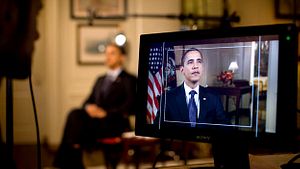U.S. President Barack Obama opened his four-country Asia tour with a first stop in Tokyo. In his first visit to Japan in three years, Obama focused heavily on reassuring Japan of the United States’ commitment to the U.S.-Japan Treaty of Mutual Cooperation and Security. The entire trip to Asia will largely focus on reassuring key U.S. allies of the America’s ongoing commitment to Asia as part of its larger strategic “rebalance” to the region.
In an interview ahead of his trip with Japan’s Yomiuri Shimbun, Obama said that the United States regards the Senkaku/Diaoyu Islands as falling under the purview of the U.S.-Japan security treaty and that the United States would oppose any attempt to undermine Japan’s control of the islands. “The policy of the United States is clear—the Senkaku Islands are administered by Japan and therefore fall within the scope of Article 5 of the U.S.-Japan Treaty of Mutual Cooperation and Security. And we oppose any unilateral attempts to undermine Japan’s administration of these islands,” Obama stated in the Yomiuri Shimbun.
The statement naturally drew protest from the Chinese foreign ministry. “The so-called US-Japan alliance is a bilateral arrangement from the Cold War and ought not to harm China’s territorial sovereignty and reasonable rights,” Chinese foreign ministry spokesman Qin Gang noted. The Senkaku/Diaoyu Islands are disputed by China and Japan, both of whom regard the entirety of the islands and their surrounding waters as their sovereign territory. In 2012, Japan purchased some of the islands from a private owner, effectively nationalizing them. Since then, the dispute has been a major feature of relations between China and Japan.
“The U.S. should respect facts, take a responsible attitude, remain committed to not taking sides on territory and sovereignty issues, speak and act cautiously and earnestly play a constructive role in regional peace and stability,” Qin Gang added.
Obama’s statement is particularly significant because it is the first time that any incumbent U.S. president has overtly stated that the Senkaku/Diaoyu Islands fall within the purview of the U.S-Japan security treaty. While other high-level U.S. officials have offered similar reassurances to Japan in the past, hearing it from the president will be especially reassuring for Japan. However, despite his willingness to support Japan on the matter of the Senkaku/Diaoyu dispute, it is unlikely that Obama will offer any similar reassurances to U.S. allies and partners in the South China Sea where similar territorial disputes exist between South China Sea littoral states and China (owing to the lack of similar treaties in the region).
In the interview, Obama also praised the Abe administration’s efforts to revise Japan’s limits on the exercise of collective self-defense: “I commend Prime Minister Abe for his efforts to strengthen Japan’s defense forces and to deepen the coordination between our militaries, including by reviewing existing limits on the exercise of collective self-defense.”
In Tokyo on Wednesday, Obama dined with Abe at the world-famous sushi restaurant Sukiyabashi Jiro (a restaurant that rose to fame after the documentary “Jiro Dreams of Sushi” received critical acclaim). The leaders are expected to follow up with additional formal talks on Thursday — talks that will likely include the Trans-Pacific Partnership (TPP) and North Korea.

































